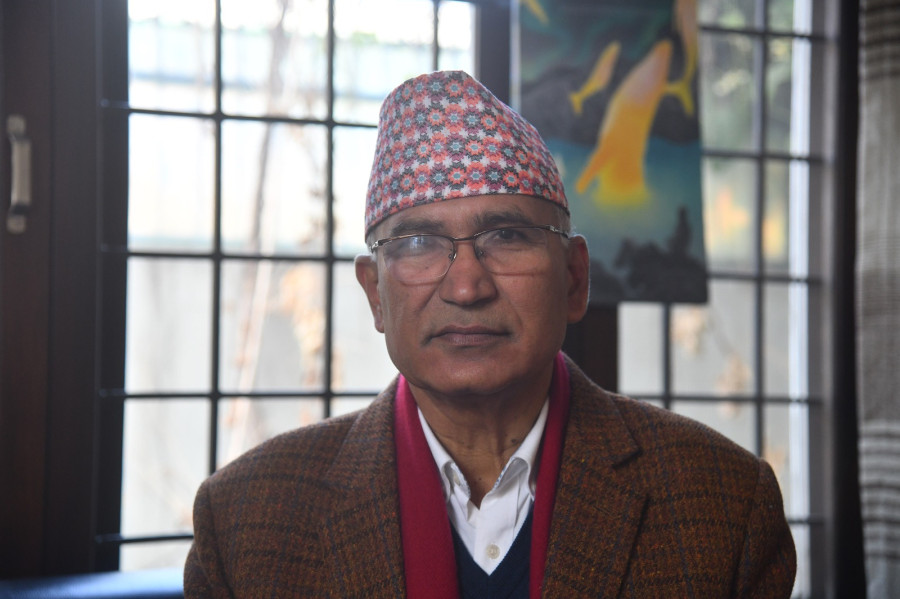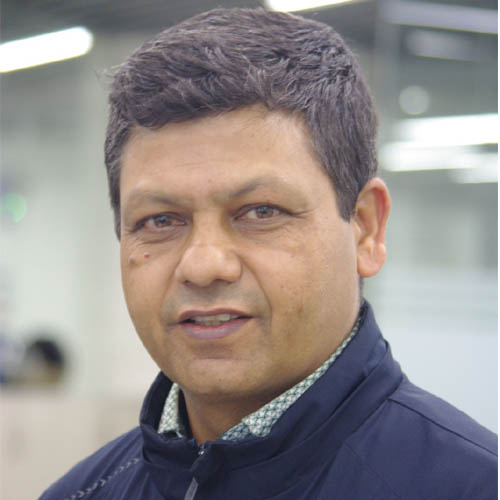Interviews
KP Oli will be elected UML chair unopposed one more time
In Nepal’s political history, one finds that those who have emerged overnight have disappeared as quickly.
Thira Lal Bhusal
The CPN-UML lost seven of the eight National Assembly seats up for grabs last week. The party, in the process, lost its status as the largest in the upper house. Thira Lal Bhusal of the Post sat down with Bishnu Prasad Paudel, CPN-UML’s vice chair and former finance minister, to get his assessment of recent political developments, the UML’s relations with other parties and possible leadership change in the party, among others.
After the recent National Assembly elections, the UML has been reduced from the first to the third largest party in the assembly, even though it pulled off a surprising win in Koshi Province. How do you analyse this development?
Ruling coalition partners shared candidacy for the seats and fought jointly. The election results don’t reflect popular mandate. It’s not a direct election as elected representatives vote for the candidates as per their respective parties’ decisions. So, the result was a given. Despite that, we won a seat in Koshi. In other provinces, we secured more votes than the weightage of the votes our party represents in the provincial and local units. Therefore, there is no reason for ruling parties to celebrate.
Still, won’t the drastic downsizing of the party in the upper house affect its functioning?
One can’t measure the real strength and status of political parties based on National Assembly elections. Based on popular votes, the UML is the country’s strongest political force. Therefore, the assembly results don’t make any difference to the role our party plays in national politics or to its status. Its strong and direct relations with the people is a big basis of our strength.
A year ago, your party made Pushpa Kamal Dahal the prime minister but later the Nepali Congress snatched him away to form its own coalition. Likewise, your party made a Congress lawmaker the chief minister in Koshi Province last year but he later left the UML and joined hands with Maoist Centre. Why has the UML leadership failed in coalitions?
There were no mistakes on our part. It all happened because of their intent. We as a responsible party forged agreements with various forces in good spirit, often to end deadlocks. But they breached the deals and betrayed us. In politics, leaders should maintain at least a minimum level of political culture and honesty. But they didn’t.
You spoke on the need for political honesty. But the Rastriya Prajatantra Party has also accused the UML of betraying them in the assembly elections.
CPN-UML is a party that never betrays others. In Koshi, some members of our party didn’t follow the party’s decision. We have taken it seriously. We will look into the matter.
Your party has announced another round of nationwide protests. Why this agitation? What is its relevance?
The UML is a major political party. We are responsible and accountable to the people. We can’t idly watch from the sidelines when the country is plagued by multiple problems and people are suffering. We have been continuously raising issues of public concern in the Parliament. But the government isn’t listening. Therefore, we are planning to go to the people and join hands with them. Now, we and the common people will jointly protest against the government’s misrule, corruption, discrimination in development activities and attempts to curtail democratic and civic rights. The economy is in bad shape and unemployment is rising alarmingly. Therefore, we have been forced to take to the streets.
UML has launched one after another campaign. It completed the ‘mission grassroots’, the journey through the Mid-Hill Highway, and now plans a street agitation. But such campaigns seem to have been limited to renewing the party’s contacts with cadres while failing to attract the general public.
The huge public participation in our Jhulaghat-Chiwabhanjyag journey answers your question. Hundreds of thousands of common people attended our events on that journey. They interacted with us. They listened to our views and gave their feedback. Therefore, the narrative that people aren’t attracted to major political forces is wrong.
But at times such public participation in rallies has made the parties draw wrong conclusions. Parties’ estimation based on election rallies don’t match the votes they get.
These aren’t election rallies. These campaigns are different. If you say low public participation in a political party’s event is its failure, you also have to say that big public turnout is a party’s success. People join our events as we raise issues of public concern and press the government to address them.
The perception is that people are frustrated by the decades-long misrule and bad governance and emerging forces are going to outdo old parties in the next election.
If the people didn’t trust the existing political forces, how would they have become such big electoral forces? In 2022, the UML fought the elections under adverse circumstances. We were in the opposition. Ruling parties formed an electoral alliance. Our party had split. Even in such a situation, the UML secured the highest number of popular votes. Though we couldn’t win the most seats, we are the largest party based on popular votes. How could we have been the largest force had people not voted for us? So, the narrative you mentioned doesn’t reflect the ground reality.
But the Rastriya Swatantra Party that was formed hardly six months before the 2022 election pulled off surprising results. Doesn’t this hint that people are desperately seeking alternatives and a great change is brewing?
The democratic system we fought for and established in the country is equal for all—old or new, big or small parties. Everyone can compete and win people’s mandate. This is natural. But a political party can’t be established in one election cycle. Hadn’t the former rebels’ Maoist party emerged the largest in 2008? We all know what happened to them in subsequent elections. In Nepal’s political history, one finds that those who have emerged overnight have fallen down as quickly. Therefore, we shouldn’t draw any conclusion about a political force so soon. Our party has a long legacy. We have the experience of fighting autocratic systems. We have experience of leading various types of governments, introducing and implementing popular policies and programmes during our rule, and playing the opposition’s role in the Parliament, as well as leading street agitation.
Can we say new forces are trying to capitalise on public dissatisfaction with traditional forces?
It is true that people are frustrated by the misrule of the present coalition. But they like UML’s policies. They think it couldn’t garner a majority to implement its policies and programmes.
There are reports of efforts being made for the unification of the CPN-UML and the CPN (Unified Socialist), the party that had earlier broken away from the UML.
In your question, you mentioned a group as a party. But our constitution doesn’t recognise it as a political party. So, we don’t and shouldn’t consider it a party.
Is it because it failed to secure the status of national party in the general election?
It hasn’t succeeded even in getting the status of a legitimate party. So, let’s not describe it as such. Second, there was a grand design to split the UML and a group of leaders were complicit in that conspiracy. What they want in return is obvious. Sometimes they beg for certain things with the Nepali Congress and sometimes with the CPN (Maoist Centre). We hear major leaders of the group that you are describing complaining with Congress and Maoist leaders that “we weren’t properly rewarded even though we did a big favour to Congress and Maoists by splitting such a powerful party, the UML, and helped form a government under your [Congress] leadership”.
All the genuine party members who were misled by the group have already rejoined the UML, except those who were determined to split the party at any cost and serve Congress and Maoist interests. So there is no point in thinking about uniting with them.
Many reckon that despite differences, the UML and the Maoist Centre may come together in yet another left unity by the time of next general elections.
The UML will consolidate leftist forces. But the modality will be different. The phase of uniting parties by bringing together a handful of so-called bigwigs is over. We will instead bring together scattered genuine left groups and individuals.
Let’s talk about UML. While public frustration with the decades-old leadership is palpable, the UML seems comfortable projecting the current leadership as the party’s future as well.
An individual who is dynamic is never irrelevant. So, the age factor should be viewed in that way. Someone can conduct a survey about present-day leaders. People will say KP Oli is the most competent, popular and right leader. When we removed the 70-year age bar for the holder of the party’s executive post, we made the decision carefully. The age bar wasn’t scientific. To be a party leader you need historical contribution, national and international recognition, popularity among the general public, decision-making as well as leadership capacity. Our present chairman, who is now efficiently leading not only the UML but also the country, will be elected party chief unopposed one more time from the eleventh [next] general convention. There is no confusion in our party.
When are the second-rung leaders like you going to lead the party?
Don’t we have a role to play now? The party has given each of us a definite role. Does everyone need to be the first man in the party? That’s not the case. We will get to lead the party when the right time comes.




 13.12°C Kathmandu
13.12°C Kathmandu




.jpg&w=200&height=120)







